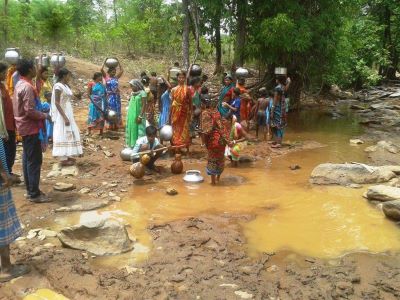Drinking Water Crisis in Tribal Areas of Odisha
Tribes Odisha: The districts of Bolangir, Nuapada, Kalahandi, Jharsuguda and Deogarh in Western Odisha always face severe drinking water due to highly deficient rainfall.
Nuapada district suffers from irregular rainfall and drought-like conditions every alternate year. Most of the tribal populations in this region dependent on rainfall to support their life-sustaining agriculture.
The men, women with their family leave their villages in search of work in the neighboring state of Chhattisgarh, Hyderabad and Andhra Pradesh.
Earlier, Titilagarh town had suffered acute drinking water scarcity and water was used to be taken by train to meet the requirement. In this area, during summer season the climate is generally very hot and dry.
The traditional tribes like the Kuda tribe of Balangir and the nomadic Bhunjia tribe were experts in digging wells and ponds and could predict the presence of water in an area just by viewing the soil. But now a days they are working as daily wage labourers, as no new water bodies are being created in the area.
The ST and Primitive Tribal Group (PTG) habitations in scattered locations and interior pockets face serious drinking water problem.
Due to highly polluted industrial and open cast and underground mining in Odisha, the local tribal people have been facing serious clean drinking water crisis.
Tribals-dominated villages of Sukinda and Badachana blocks in Jajpur district are facing water scarcity in summer season.
In many villages in the district, locals drink the polluted waters from the ponds, channels and other water bodies. Tribal women still have to walk for miles in the sun to fetch drinking water for their daily requirements.
Lack of awareness about sanitation, toilet access and clean drinking water leads to waterborne diseases including Jaundice outbreak in these region.
Ground water level is going down rapidly due to excessive use for irrigation especially in rain fed Sundargarh and Balasore districts.
Shortage of drinking water due to non-maintenance of tube-wells and water tanks, villagers of tribal-dominated, poverty stricken and Maoist affected villages of Rayagada district have suffered with water-borne diseases like cholera, dysentery and diarrohea.

